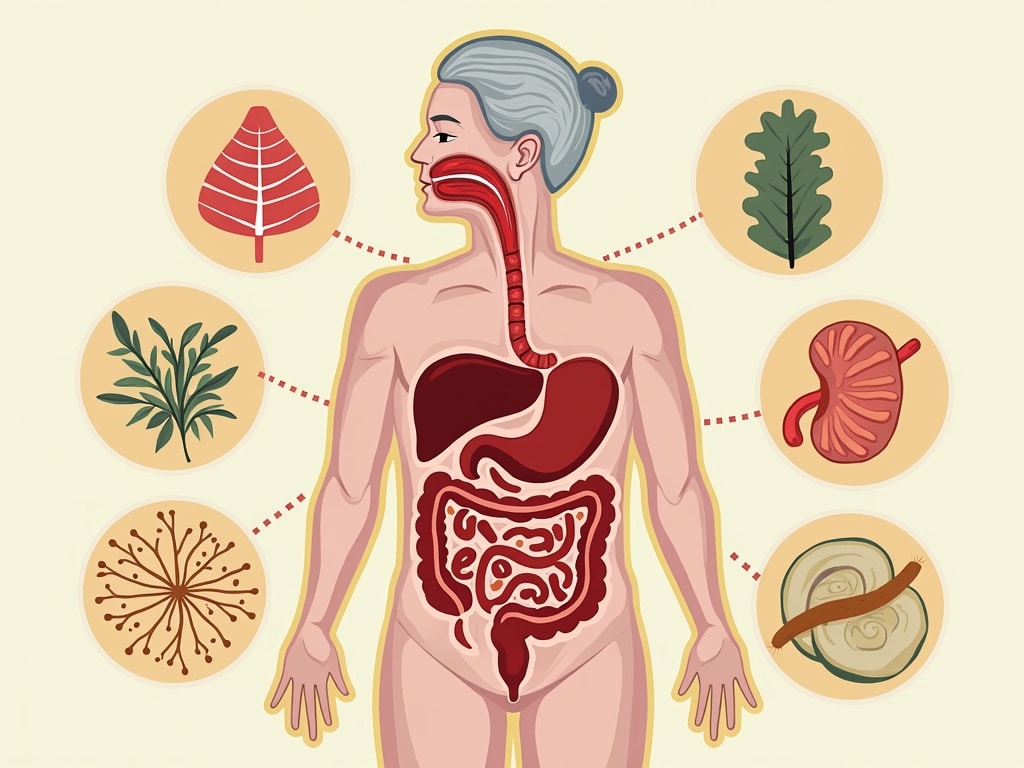Unmasking the Discomfort: Spotting Signs of an Unhealthy Gut in Seniors
Imagine a garden overgrown with weeds, its vibrant flowers struggling to thrive. Similarly, an unhealthy gut in seniors can disrupt their overall well-being, hindering their ability to absorb nutrients, maintain energy levels, and enjoy life to the fullest. It's essential to recognize the subtle signs that indicate a gut imbalance in our aging loved ones, as early detection can significantly improve their quality of life.
Why Gut Health Matters for Seniors
As we age, our bodies undergo numerous changes, and the gut is no exception. The delicate balance of bacteria within the digestive system can be easily disrupted by factors such as medication use, dietary changes, and decreased physical activity. This imbalance, known as gut dysbiosis, can lead to a variety of health problems, particularly in seniors.
A healthy gut plays a vital role in:
- Nutrient absorption: The gut breaks down food and absorbs essential vitamins and minerals necessary for energy, bone health, and cognitive function.
- Immune function: A significant portion of the immune system resides in the gut, protecting the body from harmful pathogens and infections.
- Mental health: The gut-brain axis connects the digestive system to the brain, influencing mood, cognitive function, and even neurodegenerative diseases.
When the gut is unhealthy, these functions can be compromised, leading to a cascade of negative effects on a senior's overall health.
Key Signs of an Unhealthy Gut in Seniors
Recognizing the signs of an unhealthy gut can be the first step toward addressing the problem and improving a senior's well-being. Here are some common indicators to watch out for:
Digestive Discomfort
This is often the most obvious sign. Keep an eye out for:
- Frequent bloating and gas: Excessive gas and bloating, even after small meals, can indicate poor digestion and bacterial imbalances.
- Changes in bowel habits: Constipation, diarrhea, or alternating between the two can signal issues with gut motility and bacterial composition.
- Abdominal pain or cramping: Persistent abdominal discomfort, even if mild, should not be ignored.
- Heartburn and acid reflux: While occasional heartburn is common, frequent occurrences can be a sign of an unhealthy gut lining or impaired digestion.
Unexplained Weight Changes
Significant and unintentional weight fluctuations can be linked to gut health:
- Unintentional weight loss: Difficulty absorbing nutrients due to an unhealthy gut can lead to weight loss despite a normal diet.
- Unexplained weight gain: Gut dysbiosis can affect metabolism and hormone regulation, potentially contributing to weight gain.
Fatigue and Low Energy
An unhealthy gut can impact energy levels:
- Persistent fatigue: Poor nutrient absorption and inflammation in the gut can lead to chronic fatigue and low energy levels.
- Weakness and muscle loss: Inadequate protein absorption can contribute to muscle weakness and loss of muscle mass.
Skin Problems
The gut-skin connection means skin issues can be a telltale sign:
- Skin rashes and eczema: An unhealthy gut can trigger inflammatory responses that manifest as skin irritations, such as rashes, eczema, or psoriasis.
- Acne: Gut imbalances can affect hormone regulation and inflammation, contributing to acne breakouts.
Mood Changes and Cognitive Issues
The gut-brain axis means that gut health impacts mental well-being:
- Anxiety and depression: Alterations in gut bacteria can affect neurotransmitter production, influencing mood and potentially contributing to anxiety and depression.
- Brain fog and memory problems: Inflammation in the gut can affect cognitive function, leading to brain fog, difficulty concentrating, and memory problems.

Other Potential Signs
- Food sensitivities and intolerances: Developing sensitivities to certain foods can indicate impaired gut function and increased intestinal permeability.
- Joint pain: Chronic inflammation in the gut can contribute to joint pain and arthritis.
- Frequent infections: A weakened immune system due to gut dysbiosis can increase susceptibility to infections.
Factors Contributing to Unhealthy Gut in Seniors
Understanding the factors that can contribute to gut problems in seniors is crucial for prevention and management. Some common culprits include:
Medication Use
Many medications, particularly antibiotics, NSAIDs, and proton pump inhibitors (PPIs), can disrupt the balance of gut bacteria and damage the gut lining. Antibiotics, while essential for treating bacterial infections, can wipe out beneficial bacteria along with harmful ones, leading to gut dysbiosis. NSAIDs, commonly used for pain relief, can irritate the stomach lining and increase intestinal permeability. PPIs, used to reduce stomach acid, can alter the gut environment and affect nutrient absorption.
Dietary Changes
Poor dietary habits, such as a diet low in fiber and high in processed foods, sugar, and unhealthy fats, can negatively impact gut health. Fiber is essential for feeding beneficial bacteria and promoting healthy bowel movements. Processed foods, sugar, and unhealthy fats can promote the growth of harmful bacteria and contribute to inflammation.
Reduced Physical Activity
Lack of physical activity can slow down gut motility and decrease the diversity of gut bacteria. Regular exercise promotes healthy digestion and can help maintain a balanced gut microbiome.
Age-Related Changes
As we age, the production of digestive enzymes and stomach acid naturally declines, which can impair digestion and nutrient absorption. Additionally, the gut lining may become thinner and more permeable, increasing the risk of inflammation and leaky gut.
Stress
Chronic stress can have a significant impact on gut health. Stress hormones can disrupt the gut microbiome, increase intestinal permeability, and contribute to digestive problems.
Strategies for Improving Gut Health in Seniors
Fortunately, there are many steps that seniors and their caregivers can take to improve gut health and alleviate symptoms.
Dietary Modifications
Focus on a balanced diet rich in fiber, fruits, vegetables, and lean protein. Incorporate probiotic-rich foods, such as yogurt, kefir, sauerkraut, and kimchi, to help replenish beneficial bacteria in the gut. Limit processed foods, sugary drinks, and unhealthy fats, which can contribute to gut inflammation.
Probiotic and Prebiotic Supplements
Probiotic supplements contain live bacteria that can help restore balance to the gut microbiome. Prebiotic supplements, on the other hand, provide food for beneficial bacteria to thrive. Consult with a healthcare professional to determine the appropriate type and dosage of probiotic and prebiotic supplements for your specific needs.
Hydration
Adequate hydration is essential for healthy digestion. Encourage seniors to drink plenty of water throughout the day to prevent constipation and promote regular bowel movements.
Regular Exercise
Encourage regular physical activity, such as walking, swimming, or gentle stretching, to improve gut motility and promote a healthy gut microbiome. Even short bursts of activity can make a difference.
Stress Management
Implement stress-reducing techniques, such as meditation, deep breathing exercises, or yoga, to minimize the impact of stress on gut health. Encourage seniors to engage in activities they enjoy and that promote relaxation.
Review Medications
Work with a healthcare provider to review medications and identify any that may be contributing to gut problems. Discuss alternative options or strategies to minimize the negative impact on gut health. Don't stop taking any prescribed medication without consulting a doctor.
Consult with a Healthcare Professional
If you suspect that a senior is experiencing signs of an unhealthy gut, it's crucial to consult with a healthcare professional for proper diagnosis and treatment. A doctor can conduct tests to assess gut health and recommend appropriate interventions, such as dietary changes, supplements, or medications.
Taking proactive steps to support gut health can significantly improve their overall well-being, energy levels, and quality of life. Remember, a happy gut equals a happy senior! Also, it's important to consult a professional if you're concerned regarding serious symptoms such as unexplained bleeding. Learn more here .
The Bottom Line
Recognizing the signs of an unhealthy gut in seniors is paramount for their overall well-being. By understanding the factors that contribute to gut problems and implementing proactive strategies to improve gut health, we can help our aging loved ones thrive and enjoy their golden years to the fullest. Prioritizing gut health is an investment in their physical, mental, and emotional well-being. It's about empowering them to live happier, healthier, and more fulfilling lives.

